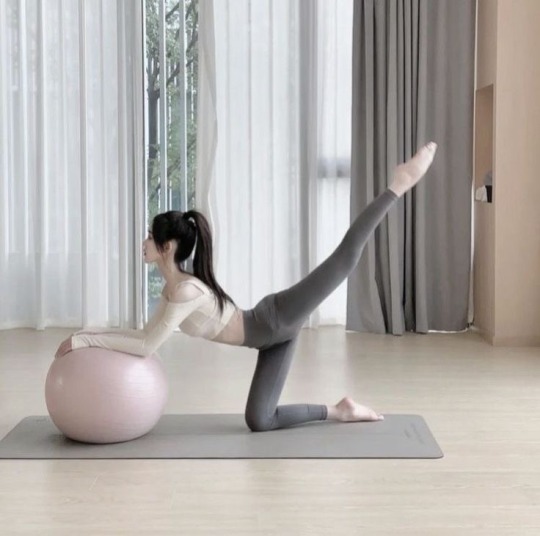#8 Habits to Improve Your Productivity and Achieve Your Goals.
Text
8 Habits to Improve Your Productivity and Achieve Your Goals.
Do you struggle with staying productive and achieving your goals? In this video, we'll share 8 habits that can help you improve your productivity and reach your goals faster. From setting clear priorities to taking breaks and staying organized, these habits are easy to implement and can make a big difference in your daily routine. Whether you're a student, entrepreneur, or just looking to be more productive, these tips will help you stay on track and achieve your goals. So, grab a pen and paper and get ready to take some notes!
youtube
#8 Habits to Improve Your Productivity and Achieve Your Goals.#productivity#self improvement#habits to change your life#Goals#Time management#Prioritization#Motivation#Daily routine#Distractions#Accountability#Positive habits#Goal setting#self improvement advice#KPB talks#self care#how to be productive#how to change your life#self help#habits#change your life#good habits#habits of successful people#80/20 rule#Learn to Say No#morning routine#Youtube
1 note
·
View note
Text



Getting your life back in 2024 (leveling up to the max)
♫₊˚.🎧✩。
In 2024, leveling up your life involves a holistic approach to personal growth. Start by setting clear, achievable goals in various aspects of your life—career, relationships, health, and personal development. Cultivate a growth mindset, embracing challenges as opportunities to learn and improve.
1. **Define Your Goals:** Clearly outline what you want to achieve in different areas of your life. Break down larger goals into smaller, actionable steps.
2. **Continuous Learning:** Invest time in expanding your knowledge and skills. Read books, take courses, attend workshops, and stay curious about the world around you.
3. **Health and Wellness:** Prioritize your physical and mental well-being. Incorporate regular exercise, balanced nutrition, and sufficient sleep into your routine.
4. **Mindfulness and Self-Care:** Practice mindfulness to stay present and reduce stress. Incorporate self-care rituals into your routine, ensuring you take time for activities that bring you joy and relaxation.
5. **Build Strong Relationships:** Cultivate meaningful connections with friends, family, and colleagues. Invest time in building positive and supportive relationships.
6. **Financial Literacy:** Improve your financial knowledge and habits. Set a budget, save, and invest wisely to secure your financial future.
7. **Career Development:** Set professional goals, seek opportunities for growth, and stay adaptable in the ever-changing job market. Network and build a strong professional support system.
8. **Embrace Change:** Be open to change and view it as a chance for growth. Adaptability is a key skill in navigating life's uncertainties.
9. **Time Management:** Organize your time efficiently. Prioritize tasks, minimize distractions, and create a schedule that allows for both productivity and relaxation.
10. **Gratitude Practice:** Cultivate gratitude by reflecting on the positive aspects of your life. This mindset shift can enhance your overall well-being.
Remember, the journey of leveling up is ongoing. Regularly reassess your goals, celebrate your achievements, and stay committed to continuous improvement. As you evolve and grow, you'll find that your life becomes more fulfilling and aligned with your aspirations.
#beauty#fashion#hyper feminine#light feminine#pink moodboard#pink pilates princess#soft moodboard#that girl#beautytips#confidence#2024#leveling up#best version#girlblogger#girlblogging#blogger#pink blog#advice blog#study blog
4K notes
·
View notes
Text






Finish what you started and transform your productivity
Recently i picked up a book i hadn't read in a long time for the past week i hadn't been able to work properly my tasks were going unfinished so i opened my cupboard and saw that book right in front of me. Then i read the whole book in just a one night and it sparked inspiration in me ..So i thought why not share everything i learned with all of you?
So I'm giving you guys a structured summary of Finish The Art of Following Through - Taking Action, Executing & Self Discipline by Peter Hollins -
1. The Importance of Execution
The ability to follow through allows you to create the life you desire rather than settling for the one you currently have. The process consists of focus, self-discipline, action, and persistence
2. Barriers to Follow Through
- Inhibiting Tactics: These include setting bad goals, procrastination, succumbing to distractions, and poor time management.
- Psychological Roadblocks: These encompass laziness, fear of judgment or failure, perfectionism driven by insecurity, and lack of self-awareness.
3. Staying Motivated
To remain motivated holds both external and internal motivators -
- External Motivators: These involve utilizing other people or resources to encourage action, such as accountability partners upfront investments and self bribery
- Internal Motivators: These focus on understanding personal benefits and improvements. Ask yourself questions such as How will this benefit me? and How will my life improve?
4. Developing a Manifesto
A manifesto is a set of daily rules that guide your actions so her are the some key rules -
- Rule 1: Identify if you’re acting out of laziness and avoid it.
- Rule 2: Limit yourself to three major tasks per day.
- Rule 3: Establish daily limitations and requirements
- Rule 4: Reaffirm your intentions through statements like I want I , will and I won't
- Rule 5: Reflect on the future consequences of not following through
- Rule 6: Utilize the concept of "just 10 minutes" to push through discomfort.
5. Follow Through Mindsets
- Mindset 1: Recognize the worthiness of your efforts.
⭐ Mindset 2: Become comfortable with discomfort.
- Mindset 3: Understand that learning comes from completing tasks.
- Mindset 4: Manage stress and anxiety effectively
6. Overcoming Procrastination
Procrastination can be managed through strategies such as:
- Temptation Bundling: Combine unpleasant tasks with enjoyable activities.
- Creating Momentum: Make starting tasks as easy as possible to gain momentum.
- Leveraging Fear: Use productive paranoia to spur action but cautiously
7. Minimizing Distractions
Create a work environment free from distractions and focus on
⭐ Single Tasking: Avoid multitasking to eliminate attention residue ( I will also create a separate blog on this topic i used to face this problem earlier and i have used many methods to reduce my habit of multitasking so i will write a blog about it. Don't worry )
- Batching Tasks: Group similar tasks to improve efficiency.
- Creating a Don't-Do List : Identify tasks to ignore and avoid ( This method is literally too much helpful )
8. The 40–70 Rule
This rule suggests acting when you have 70% of the necessary information as waiting for 100% is unrealistic
9. The Importance of Rest
Recognize the value of rest and relaxation as essential for mental recovery
10. Common Pitfalls
- False Hope Syndrome: Avoid unrealistic expectations and set achievable goals.
- Overthinking: Avoid excessive rumination and focus on taking action.
- Worrying: Concentrate on the present and control what you can.
11. Developing Daily Systems
Establish daily behaviors that promote consistency and long term success
⭐ Keep a Scoreboard: Track progress for motivation ( Ive been using this method for the past four days it literally shows me where I am making mistakes and what I need to do to complete my unfinished tasks )
By following these structured advice you can improve your ability to finish what you start and achieve your goals
If you have any questions or tips to share feel free to drop them in the comments in here to chat , Stay connected for more tips and insights thanks :)
#100 days of productivity#productivityboost#productivity challenge#productivitytips#study inspiration#studyblr#study blog#pink blog#20 days of april breaking the cycle challenge#desi studyblr#study motivation#it girl mentality#well being#pinterest girl#becoming that girl#clean girl#it girl#girlblogging#law of assumption#self development#self image#self improvement#thewizardliz#light academia#dark academia#dark academic aesthetic#chaotic academia#vogue paris#do it yourself#this is a girlblog
381 notes
·
View notes
Text
10 Tips for Developing a Daily Writing Practice

Every year, we’re lucky to have great sponsors for our nonprofit events. Scrivener, a 2023 Camp NaNoWriMo sponsor, is an award-winning writing app designed to help you get writing and keep writing. Here, Scrivener user and first time Camper, Bookstagrammer, aspiring author, and visual storyteller Yeldah Yousfi shares her tips on how to write consistently:
Writing consistently is one of the most important habits to cultivate if you want to become a better writer and reach your Camp NaNoWriMo target. However, while developing a habit of daily writing practice is useful for exercising your writing skills, it can be difficult to maintain.
Here are ten tips that I personally use for developing a habit of writing consistently every day:
1. Set a schedule.
One of the most important steps to developing a consistent writing habit is to set a schedule. Set aside a specific time every day that you can dedicate to writing—even if you just try this during Camp. This will help you to make writing a routine part of your day, and it will also make it easier to stay motivated and avoid procrastination.
2. Create a writing space.
It’s important to have a designated space that is comfortable and conducive to writing. This could be a home office, a library, or even a cafe. Whatever you choose, make sure it is comfortable and free of distractions so that you can focus on your writing.
3. Track your progress.
Keeping track of your writing progress can help keep you motivated and on track. This could be as simple as making a checklist of goals for each day or tracking your word count so you can see how much you’ve written each day.
4. Set achievable goals.
Having realistic goals is essential for staying motivated. It’s best to set smaller goals that are achievable in the short-term, such as writing 500 words a day, rather than trying to tackle a huge project all at once.
5. Take breaks.
Taking breaks (no matter how short) can help you stay focused, energized, and allows for the mind to rest and to process the material that was just written. Taking a short break every two hours or so will help you to stay productive and prevent burnout. Walking outside always makes me feel better, and I find it helps generate more ideas.
6. Read, read, read.
One of the best ways to become a better writer is to read, especially reading books in the genre you are writing in. Reading helps to open the mind to new ideas, concepts, and possibilities. You can also use the work of other authors to learn more about the craft of writing and to help you come up with ideas for your own work.
7. Don’t be afraid to make mistakes.
Making mistakes is a part of the writing process. When you start writing, keep writing, even if it’s only for ten minutes. It probably won’t be perfect (or even good if it’s your first-time writing), but that’s okay—the more you write, the better you will become. Don’t be afraid to make mistakes and learn from them as you go.
8. Have a support system and a writing partner.
Having a support system that you can reply on can be a great help in staying motivated and on track with your daily writing goals. This could be a friend or family member, or pick a Camp Counselor or writing group from the Camp forums. They can provide encouragement and help to keep you accountable. Additionally, having someone who is willing to read and give feedback on pieces of writing can be invaluable.
9. Reward yourself.
Celebrate your successes and reward yourself for your progress. Whether it’s a special treat or just a pat on the back, make sure to recognize your achievements and reward yourself for reaching your goals.
10. Take it one step at a time.
Writing is a process, and it takes time to develop a consistent writing habit. Don’t get discouraged if you don’t make progress right away. Just keep going and take it one step at a time.
Developing a consistent writing habit is essential for improving your writing skills and becoming a better writer. By following these ten tips, you can develop a habit of writing every day and make it a routine part of your life. Try it through July and see!
Yeldah Yousfi is a reader, aspiring author and visual storyteller. Check out Yeldah’s Instagram.
Top photo by Towfiqu barbhuiya on Unsplash.
#nanowrimo#camp nanowrimo#writing#writing tips#writer's life#by nano sponsor#scrivener#yeldah yousfi
265 notes
·
View notes
Text
Tips and Tricks for Writing Your First Book I have learned as a Newbie Writer
Writing a book is a thrilling, yet daunting, journey. Whether you’re crafting a novel, memoir, or non-fiction, the process requires dedication, creativity, and a bit of strategy. Here are some tips and tricks to help you navigate the path to becoming a published author.
1. **Start with a Strong Idea**
Every great book begins with a compelling idea. Spend time brainstorming and refining your concept. Ask yourself:
- What message or story do I want to share?
- Who is my target audience?
- What makes my idea unique?
A well-defined idea serves as a solid foundation for your book.
2. **Create an Outline**
An outline helps organize your thoughts and provides a roadmap for your writing. It doesn’t have to be detailed, but it should cover the main points or chapters. This structure will keep you focused and prevent you from straying too far off track.
3. **Set Realistic Goals**
Writing a book is a marathon, not a sprint. Set achievable daily or weekly word count goals. Consistency is key. Even writing a small amount each day can lead to significant progress over time.
4. **Establish a Writing Routine**
Find a time and place where you can write without distractions. Whether it’s early in the morning, during lunch breaks, or late at night, stick to your routine. Consistent writing habits will help you stay disciplined and productive.
5. **Just Write**
Don’t get bogged down by perfectionism. Your first draft doesn’t have to be flawless. Focus on getting your ideas down on paper. You can always revise and polish later. The most important thing is to keep moving forward.
6. **Embrace Revisions**
Writing is rewriting. Once you’ve completed your first draft, take a break before revising. This will give you a fresh perspective on your work. Be prepared to make significant changes. Consider feedback from trusted readers or editors to improve your manuscript.
7. **Research and Read**
If you’re writing non-fiction, thorough research is crucial. For fiction writers, reading widely in your genre can provide inspiration and insight into what works and what doesn’t. Analyze the structure, style, and character development in books you admire.
8. **Develop Your Characters**
For fiction writers, creating believable and relatable characters is essential. Spend time developing their backstories, motivations, and personalities. Characters should drive your plot and engage your readers.
9. **Stay Organized**
Keep track of your research, notes, and drafts in an organized manner. Use digital tools like Scrivener, Evernote, or Google Docs to store your materials. Staying organized will save you time and reduce stress.
10. **Take Care of Yourself**
Writing can be mentally and physically demanding. Take regular breaks, stay hydrated, and get enough sleep. Exercise and relaxation techniques can help maintain your overall well-being and keep your creativity flowing.
11. **Join a Writing Community**
Connecting with other writers can provide support, motivation, and valuable feedback. Join writing groups, attend workshops, or participate in online forums. Sharing your experiences and challenges with others can make the writing process less isolating.
12. **Stay Persistent**
There will be times when you feel stuck or discouraged. Remember that every writer faces these challenges. Keep pushing forward, even when it’s difficult. Persistence is often the difference between an aspiring writer and a published author.
13. **Learn About Publishing**
Whether you choose traditional publishing or self-publishing, educate yourself about the process. Research agents, publishers, and platforms. Understand the pros and cons of each route to make informed decisions about your book’s future.
14. **Celebrate Milestones**
Writing a book is a significant achievement. Celebrate your progress, whether it’s finishing a chapter, hitting a word count goal, or completing your first draft. Acknowledging your accomplishments will keep you motivated and positive.
Conclusion
Writing a book is a rewarding journey that requires dedication, creativity, and patience. By following these tips and tricks, you’ll be better equipped to navigate the writing process and bring your story to life. Remember, every author’s journey is unique. Find what works best for you and keep writing!
Happy writing!
7 notes
·
View notes
Text
May Monk Mode Challenge

I made another challenge!! May Monk Mode Challenge - A Studyblr Challenge! In this challenge, we will incorporate the productivity hack "Monk Mode" to help you stay focused and productive during your study sessions. The goal of this challenge is to create a habit of consistent and effective studying that will help you reach your academic goals. I am excited because I made a post about it back in March but already started the April Study Challenge so here we go!
Don't know what "Monk Mode" means in terms of studying? I made a post about it here! - LINK

Set aside a specific time each day for your study session. This could be early in the morning, after lunch, or in the evening, whichever works best for your schedule.
Turn off all distractions, including your phone, notifications, and any other potential distractions.
Create a study space that is quiet and free from distractions.
Set a timer for 60 minutes and commit to studying without any breaks or interruptions during this time.
After the 60 minutes are up, take a 10-minute break and then repeat the process.
One session = 60 mins study + 10 mins break. At least complete one session a day.

Day 1: What are your academic goals for this month? Write down your goals and the steps you need to take to achieve them.
Day 2: What subjects or topics do you struggle with the most? Identify your weak areas and make a plan to improve them.
Day 3: Create a study schedule for the next week, including specific topics you need to focus on.
Day 4: Review your notes from the past week and summarize the key concepts.
Day 5: Watch a video or read an article related to one of your subjects. Write a brief summary and explain how it relates to what you are studying.
Day 6: Practice active recall by testing yourself on the material you have learned so far. Use flashcards or quiz yourself.
Day 7: Reflect on your progress over the past week. What have you accomplished, and what can you improve upon?
Day 8: Identify any distractions that prevent you from studying effectively. Make a plan to eliminate them.
Day 9: Set a specific goal for your study session today. What do you want to accomplish in the next hour?
Day 10: Review your study schedule from Day 3. Are you on track to meet your goals? If not, adjust your schedule as needed.
Day 11: Practice visualization by imagining yourself acing your upcoming exams. How does it feel to achieve your academic goals?
Day 12: Identify your preferred learning style (e.g., visual, auditory, kinesthetic). How can you incorporate this into your study sessions?
Day 13: Take a practice test to gauge your understanding of the material. What areas do you need to focus on more?
Day 14: Reflect on your study space. Is it conducive to learning, or can you make improvements?
Day 15: Review the notes and study materials from one of your favorite classes. What makes this subject interesting to you?
Day 16: Create a mind map or flow chart to organize the information you have learned so far.
Day 17: Watch a TED talk or listen to a podcast related to one of your subjects. What did you learn from it?
Day 18: Use the Pomodoro technique (25-minute study sessions with 5-minute breaks) to help you stay focused.
Day 19: Review any feedback from teachers or professors. How can you incorporate this feedback into your studying?
Day 20: Take a break and do something that relaxes you (e.g., exercise, read a book, take a walk).
Day 21: Reflect on your progress over the past three weeks. What have you accomplished, and what can you improve upon?
Day 22: Identify any study habits that are not serving you well. How can you replace them with more effective habits?
Day 23: Use a mnemonic device (e.g., acronym, song, image) to help you remember a complex concept.
Day 24: Take a practice test or quiz yourself on the material you have learned so far. How much have you retained?
Day 25: Reflect on your motivation. Why are you studying this subject, and how can you maintain your motivation?
Day 26: Create a study group or find a study buddy to help keep you accountable.
Day 27: Use the Feynman Technique (teaching a concept to someone else) to help reinforce your understanding.
Day 28: Take a break from studying and attend a virtual academic event (e.g., seminar, lecture, conference).
Day 29: Review your study schedule for the month. What did you learn about your studying habits and how can you improve them?
Day 30: Reflect on your progress throughout the month. What have you accomplished, and what do you plan to do differently next month to continue improving your academic performance?
Day 31: Celebrate your accomplishments! Reward yourself for your hard work and dedication throughout the month.

I will be adding this challenge to my Study Challenges List!
Want to do another study challenge? I made a masterpost of all of the Studyblr challenges you could try and complete! - LINK
Remember to post about your progress using the #mmmstudy hashtag to track your progress and connect with other participants!
Good luck!
#mmmstudy#may monk mode challenge#studyblr challenge#study challenge#studying challenge#studyblr#studying#academia#study#studyspo#study tips#study aesthetic#motivation#productivity#monk mode#motivation to study#study notes#study blog#study motivation#law school#university student#university studyblr#university studyspo#studyinspo
68 notes
·
View notes
Text
Enhance Your Productivity: Practical Tips for Reading Faster and Retaining More Information

Reading efficiently is a valuable skill that can significantly enhance your productivity and knowledge retention. Whether you're a student, a professional, or an avid reader, improving your reading speed and comprehension can positively impact various aspects of your life. In this blog, we'll explore practical tips and techniques to help you read faster and absorb information more effectively.
1. Set Clear Reading Goals:
Setting specific reading goals can help you stay focused and motivated. Determine the amount of time you want to dedicate to reading each day and set achievable targets for the number of pages or chapters you aim to cover. This simple practice can create a structured approach to your reading habits and drive consistent progress.
2. Eliminate Distractions:
Create a conducive environment for reading by minimizing distractions. Find a quiet space, turn off electronic devices, or use apps that block notifications during your reading sessions. Distraction-free reading allows you to immerse yourself fully in the material, leading to improved focus and comprehension.
3. Practice Active Reading:
Engage with the text actively by asking questions, summarizing key points, and making connections to your own experiences. Actively processing the material enhances comprehension and retention. It's essential to interact with the content rather than passively scanning through it, as active reading stimulates critical thinking and deeper understanding.
4. Expand Your Vocabulary:
A broader vocabulary enhances reading speed and comprehension. Make an effort to learn new words and their meanings to improve your ability to recognize and understand them while reading. Constantly expanding your vocabulary can lead to faster and more fluent reading.
5. Use a Pointer or Guide:
When reading physical books or printed material, use your finger, a pen, or a ruler to guide your eyes along the lines. This assists in maintaining focus and reduces the tendency for unnecessary re-reading or losing your place in the text.
6. Minimize Subvocalization:
Subvocalization, the habit of silently pronouncing each word while reading, can slow down your reading speed. Practice reducing this tendency to train yourself to process information at a faster pace. Minimizing subvocalization can help you move through the text more efficiently.
7. Improve Eye Movement:
Train your eyes to move smoothly across the page instead of fixating on each word individually. Techniques such as peripheral vision expansion and chunking can help you take in more content at once and enhance your reading speed while maintaining comprehension.
8. Avoid Regression:
Resist the urge to constantly re-read sentences or skip back to previous paragraphs. Stay focused on moving forward through the text, as consistent regression can impede your reading speed and disrupt the flow of information absorption.
9. Select Appropriate Reading Material:
Choose books and articles that align with your interests and reading level. Starting with material you find engaging and accessible can facilitate faster reading and enhanced enjoyment. When you're genuinely interested in the content, you're more likely to read at a quicker pace and retain the information effectively.
10. Practice Speed Reading Techniques:
Experiment with techniques such as skimming, scanning, and meta-guiding to train yourself in processing information at an accelerated pace. These techniques can help you quickly identify key points and main ideas within a text, contributing to an overall improvement in reading speed and efficiency.
Note: Enhancing your reading speed and comprehension is a skill that can be developed with dedication and practice. By implementing the tips and techniques outlined in this blog, you can improve your ability to process information efficiently, ultimately leading to increased productivity and knowledge acquisition.
Remember, while speed reading is beneficial, it's crucial to maintain a balance between speed and comprehension to fully grasp and retain the material. With consistent practice and a focused approach, you can transform your reading habits and amplify your productivity in various areas of your life.
#reading#books and reading#books lover#productivitytips#writers on tumblr#study tips#reading tips#tumblog#practice#reading challenge#blog post
8 notes
·
View notes
Text
✍️ How to Develop a Writing Routine
If you’re first getting started as a writer, a writing routine can help you establish a habit of writing regularly, improving your productivity and creativity. Writing routines can also help you stay motivated and focused on your work.
📅 The Basics of a Writing Routine
Writing routines are different for every person, and what works for one person might not work for another. You might have to play around and try different things to find what works for you.
Here are some tips to help you establish a writing routine:
Set clear goals. Define your writing goals, whether writing for a set amount of time per day or writing a certain number of words, etc. Having clear goals will provide direction and motivation for your routine.
Determine your optimal writing time. Identify the time of day when you feel most energized, focused, and creative. It could be early morning, late at night, or any other time that works best for you. Choose a time slot that you can consistently dedicate to your writing practice and schedule those blocks of time in a calendar. Treat this time as a non-negotiable appointment.
Create a conducive writing environment. Designate a space that is conducive to writing. It could be a quiet corner in your home, a local coffee shop, or a library. Eliminate distractions as much as possible and set up your writing area with the necessary tools and resources to support your writing process.
Start with manageable commitments. Begin with small, achievable writing goals to build momentum. For example, commit to writing for 15 minutes daily or a specific number of words. As you develop consistency, you can gradually increase the duration or intensity of your writing sessions.
Develop rituals or triggers. Establish rituals or triggers that signal the start of your writing routine. It could be making tea, listening to a particular song, or reading a few pages of a book. These cues help condition your mind to transition into the writing mode and enhance focus.
Experiment and adapt. Be flexible and willing to adjust your routine as needed. If your chosen writing time or location is not working optimally, try different approaches until you find what suits you best. Experiment with different techniques, such as freewriting, outlining, or brainstorming, to discover what enhances your productivity and creativity.
Hold yourself accountable. Find accountability measures that work for you. It could involve sharing your writing goals with a writing partner or joining a writing group where you can regularly discuss your progress. Alternatively, you can use productivity apps or tools that track your writing time or word count.
Read more: The Different Types of Editing
⭐ The Routines of Famous Authors
If you’re struggling to come up with ideas for your writing routine, try borrowing practices from some authors you might know:
Ernest Hemmingway
“When I am working on a book or a story I write every morning as soon after first light as possible. There is no one to disturb you and it is cool or cold and you come to your work and warm as you write. You read what you have written and, as you always stop when you know what is going to happen next, you go on from there. You write until you come to a place where you still have your juice and know what will happen next and you stop and try to live through until the next day when you hit it again. You have started at six in the morning, say, and may go on until noon or be through before that. When you stop you are as empty, and at the same time never empty but filling, as when you have made love to someone you love. Nothing can hurt you, nothing can happen, nothing means anything until the next day when you do it again. It is the wait until the next day that is hard to get through.”
Kurt Vonnegut
“I awake at 5:30, work until 8:00, eat breakfast at home, work until 10:00, walk a few blocks into town, do errands, go to the nearby municipal swimming pool, which I have all to myself, and swim for half an hour, return home at 11:45, read the mail, eat lunch at noon. In the afternoon I do schoolwork, either teach or prepare. When I get home from school at about 5:30, I numb my twanging intellect with several belts of Scotch and water ($5.00/fifth at the State Liquor store, the only liquor store in town. There are loads of bars, though.), cook supper, read and listen to jazz (lots of good music on the radio here), slip off to sleep at ten. I do pushups and sit ups all the time, and feel as though I am getting lean and sinewy, but maybe not.”
Stephen King
“I sit down, from 8:00 to 8:30, somewhere within that half hour every morning. I have my vitamin pill and my music, sit in the same seat, and the papers are all arranged in the same places…The cumulative purpose of doing these things the same way every day seems to be a way of saying to the mind, you’re going to be dreaming soon.”
Alice Munro
“I write every morning, seven days a week. I write starting about eight o’clock and finish around eleven….I am so compulsive that I have a quota of pages. I’m also compulsive now about how much I walk every day….Three miles every day, so if I know I’m going to miss a day, I have to make it up. I watched my father go through this same thing. You protect yourself by thinking if you have all these rituals and routines then nothing can get you.”
#writing community#writing advice#creative writing#writers#writing tips#writers craft#writblr#writers life#writer things#writers community#writers corner#writing corner#writing a novel#writing fiction#writing group#writing guide#writing goals#writing help#writing is a process#writing journey#writing motivation#writing major#writing novels#writing on tumblr#writing practice#writing tumblr#writing tropes#writing vibes#writing wise#writing writing writing
25 notes
·
View notes
Text
Self-discipline is important for several reasons:
1. Achieving goals: Self-discipline helps you stay focused and motivated to achieve your goals and aspirations.
2. Building character: Self-discipline shapes your character, teaching you values like responsibility, perseverance, and hard work.
3. Improving relationships: Self-discipline helps you set healthy boundaries, communicate effectively, and nurture stronger relationships.
4. Enhancing self-esteem: Self-discipline boosts self-esteem, confidence, and self-worth, as you accomplish tasks and reach milestones.
5. Promoting health and wellness: Self-discipline leads to healthy habits, regular exercise, and balanced living.
6. Increasing productivity: Self-discipline streamlines your workflow, prioritizes tasks, and maximizes productivity.
7. Developing resilience: Self-discipline helps you bounce back from setbacks, overcome obstacles, and adapt to challenges.
8. Cultivating inner strength: Self-discipline builds inner strength, enabling you to navigate difficult situations and make tough decisions.
9. Supporting personal growth: Self-discipline fosters a growth mindset, encouraging continuous learning and self-improvement.
10. Enhancing overall well-being: Self-discipline contributes to a sense of purpose, direction, and fulfillment, leading to a more satisfying life.
By practicing self-discipline, you invest in yourself, your relationships, and your future. Remember, self-discipline is a muscle that can be developed over time with practice, patience, and persistence.
#discipline#god#self care#bible#christianity#self help#self improvement#jesus#becoming that girl#black love#boyfriend
6 notes
·
View notes
Text
Unlocking Weight Loss Success Tips for Keyboard Warriors

Are you a keyboard warrior on a quest for weight loss? While spending long hours at your desk, battling deadlines and conquering tasks, it's easy to neglect your health and fitness goals. But fear not! With the right strategies, you can achieve your desired weight while still slaying it in front of your computer screen. Here are some unique tips tailored for the modern keyboard-centric lifestyle:
1. Deskercise Like a Boss
Incorporate desk exercises into your daily routine to keep your body active even during intense work sessions. Try simple stretches, leg lifts, or even desk push-ups to keep your muscles engaged and your metabolism fired up.
2. Hydration Station:
Keep a water bottle by your side and make it your trusty companion throughout the day. Staying hydrated not only supports overall health but also helps control hunger, keeping those midday snack attacks at bay.
3. Mindful Munching:
Snacking can easily become a mindless habit when you're engrossed in work. Instead of mindlessly munching on chips or cookies, opt for healthier alternatives like nuts, fruits, or veggie sticks. Portion out your snacks beforehand to avoid overeating.
Visit and see gym clothes


Visit and see gym clothes
4. Tech Tools for Tracking:
Leverage technology to track your progress. Use apps or wearable fitness devices to monitor your daily steps, calorie intake, and even your posture. This data can provide valuable insights and keep you accountable on your weight loss journey.
5. Power of Planning:
Take a few minutes each day to plan your meals and snacks. Having a rough outline of what you'll eat throughout the day can prevent impulsive food choices and help you stay on track with your calorie goals.

6. Stand Tall:
Consider investing in a standing desk or a convertible desk converter. Alternating between sitting and standing throughout the day not only improves posture but also burns more calories compared to sitting for prolonged periods.
7. Ergonomic Essentials:
Pay attention to your workspace setup. Invest in an ergonomic chair, keyboard, and mouse to ensure proper alignment and support for your body. A comfortable workspace can prevent discomfort and promote better productivity.
If you want to buy some clothes or any item for gym then buy from here

Visit and see gym clothes
8. Sip Smartly:
Be mindful of what you're sipping on during work hours. Sugary beverages like soda or energy drinks can contribute to unwanted calories. Opt for healthier options like herbal teas or infused water to stay hydrated without the added sugars.
3 notes
·
View notes
Text
Negative Habits to Avoid for UPSC Preparation
Imagine preparing for the UPSC exam is like setting off on a thrilling adventure. But just like any adventure, there are challenges to overcome. It takes a lot of hard work, sticking to your goals, and having a good plan. But, sometimes, even if you're really trying your best, you might find yourself doing things that could make it harder for you to succeed. In this guide, we'll explore common negative habits faced by UPSC aspirants and provide straightforward solutions to overcome them. By implementing these simple strategies, aspirants can navigate through challenges effectively and achieve success in their UPSC journey.
Procrastination - Putting Off Tasks

Procrastination is when we delay tasks or waste time on unimportant things. Many UPSC aspirants struggle with procrastination, which can lead to missed study sessions and last-minute pressure.
To overcome procrastination, break your study tasks into smaller, manageable parts. To create a sense of urgency, establish particular deadlines for every task. By taking small steps consistently, you can avoid procrastination and stay on track with your study schedule.
“You may delay, but time will not.”
― Benjamin Franklin
There are always distractions, if you allow them! Successful people remain optimistic and concentrated on their goals regardless of their surroundings. They stay focused. They avoid getting distracted, which is common in today's digital world. Social media, notifications, and other distractions can easily divert our attention away from studying.
To avoid distractions, create a dedicated study space that is free from potential distractions. Turn off notifications on your phone and use productivity tools to block distracting websites. Set specific times for studying and avoid multitasking. By minimizing distractions, you can improve focus and productivity during your study sessions.
Distractions - Losing Focus

“Work is hard. Distractions are plentiful. And time is short.”
― Adam Hochschild
Lack of Consistency

Consistency is really important for doing well in UPSC preparation. It’s key to success. However, many aspirants struggle to maintain a consistent study routine.
To overcome this, establish a daily study schedule and stick to it religiously. Make sure you stick to your study schedule and give it more importance than other things. Set realistic goals for each study session and keep checking how well you're doing. By making studying a habit and sticking to a consistent routine, you can maximize your productivity and progress in your UPSC preparation.
“Success isn't always about greatness. It's about consistency.
Consistent hard work leads to success. Greatness will come.”
― Dwayne Johnson
Neglecting Health and Adequate Sleep

UPSC preparation can be mentally and physically demanding, and many aspirants neglect their health in pursuit of their goals. However, neglecting your health can have negative consequences on your ability to study effectively. Sleep is essential for cognitive function, memory retention, and overall well-being. However, many aspirants neglect their sleep in favor of studying late into the night. This can lead to sleep deprivation, which can impair your ability to focus, concentrate, and retain information.
To prioritize your health, make sure to get an adequate amount of sleep each night. Aim for at least 7-8 hours of sleep to ensure that your mind and body are well-rested. In addition, make time for regular exercise and physical activity to reduce stress and improve overall well-being. Finally, don't forget to eat a balanced diet and stay hydrated to fuel your body and brain for studying.
Relying on One Study Method

Every aspirant has their own preferred study method, whether it's reading, taking notes, or practicing past papers. However, relying solely on one study method can limit your learning and comprehension.
To overcome this, try diversifying your study methods to engage different parts of your brain. For example, if you're used to reading, try incorporating more visual aids or discussing concepts with peers. Try out various methods of studying until you discover which one suits you the most. By diversifying your study methods, you can improve your understanding and retention of the material.
Negative self-talk can be dangerous to your confidence and motivation. Many aspirants struggle with self-doubt and fear of failure, which can hold them back from reaching their full potential.
To overcome negative self-talk, practice self-compassion and positive affirmations. Instead of focusing on your shortcomings, celebrate your achievements and strengths. Be around friends and family who support you and have faith in your skills. By cultivating a positive mindset and practicing self-love, you can overcome self-doubt and achieve success in your UPSC journey.
Negative Self-Talk - Self-Doubt

"One important key to success is self-confidence.
An important key to self-confidence is preparation."
― Arthur Ashe
Trying to Read Everything

UPSC aspirants are often overwhelmed by the sheer volume of reading material available. Many aspirants feel pressured to read every book and resource on a given topic, leading to stress and burnout.
To overcome this, focus on quality over quantity when it comes to reading. Prioritize essential books and resources that cover the core concepts and topics of the UPSC syllabus. Take notes as you read to help reinforce your understanding and retention of the material. Remember, it's better to thoroughly understand a few key concepts than to skim/go through numerous resources without grasping the core concepts.
Disorganization can hinder your ability to study effectively and efficiently. Many aspirants struggle to keep track of study materials, deadlines, and important dates.
To overcome this, create a study schedule and organize your study materials in a systematic manner. Use folders, binders, or digital tools to keep your study materials organized and easily accessible. Break down your study schedule into smaller, manageable tasks and set deadlines for each task. By staying organized, you can reduce stress and improve productivity in your UPSC preparation.
Lack of Organization

“For every minute spent organizing, an hour is earned.”
― Benjamin Franklin
Misplaced Study Groups

Study groups can be a valuable resource for UPSC aspirants, providing support, motivation, and shared knowledge. However, not all study groups are created equal, and some aspirants may find themselves in study groups that are not conducive to effective studying.
To overcome this, choose study partners wisely and find individuals who are serious and committed to their UPSC goals. Look for study groups or forums where you can engage with like-minded aspirants who share your dedication and enthusiasm for UPSC preparation. By surrounding yourself with supportive and motivated study partners, you can enhance your learning and stay on track with your UPSC goals.
Overcoming negative habits is essential for UPSC aspirants to succeed in their journey. By implementing simple strategies such as breaking tasks into smaller parts, minimizing distractions, maintaining consistency, prioritizing health, diversifying learning methods, fostering a positive mindset, finding a balance between work and study, focusing on quality reading, staying organized, choosing study partners wisely, using the internet judiciously, and prioritizing sleep, aspirants can navigate through challenges effectively and achieve success in their UPSC preparation. Remember, success in the UPSC examination requires dedication, perseverance, and a willingness to overcome obstacles. Keep pushing forward, stay focused on your goals, and believe in yourself—victory is within reach!
#upsc#education#upsc2024#upscpreparation#upscstudymaterial#quotes for upsc aspirants#quotes for students motivation#Misplaced Study Groups in UPSC Preparation#Lack of Organization in UPSC Preparation#Trying to Read Everything in UPSC Preparation#Negative Self-Talk - Self-Doubt#Relying on One Study Method#Neglecting Health and Adequate Sleep in upsc preparation#Lack of Consistency in upsc preparation#Distractions in upsc preparation#procrastination in upsc preparation#Procrastination#upsc syllabus ignorance#upsc exam strategy mistakes#ENSURE IAS coaching tips#upsc self-study bad habits#upsc time management mistakes#ENSURE IAS academy tips#upsc coaching center habits to avoid#upsc study routine mistakes#UPSC#bad habits for upsc exam#common mistakes in upsc preparation#ENSURE IAS preparation tips#negative habits for upsc aspirants
3 notes
·
View notes
Text
Build a Better Writing Routine
Preptober for NaNoWriMo is finally here! As we gear up for a month of novel writing, it's the perfect time to figure out how to create a solid writing routine that will last long after National Novel Writing Month.
Stephen King is known for his 10-page, 2,000-word daily writing routine. Maya Angelou was famous for renting a hotel room to write. Anne Lamott coined the phrase morning pages. Every famous writer has a different routine, but the key is that each writer has a routine. What is the best writing routine for you? One you can actually commit to.
Whether you’re getting ready for NaNoWriMo or would just like to improve the quality of your writing time, getting into the writing habit doesn’t have to be a chore when you find your own creative rhythm.
9 Bonus TIPS FOR CREATING A REGULAR WRITING ROUTINE
Here are nine steps to develop a writing plan that works for you and your schedule.
1. DISCOVER YOUR BEST TIME
Think about the moments when your mind is most awake, alert, and ready to tackle creative challenges. It could be in the morning, afternoon, or even late at night. Finding your peak productivity hours is your secret weapon.
2. SET REALISTIC GOALS
Don’t create a schedule you can’t keep. Make sure your goals are realistic and attainable. Whether you measure by word count, a scene, or simply putting your thoughts on paper, give yourself the freedom to adapt as needed.
3. CREATE YOUR WRITING NOOK
Find a spot where you can comfortably sit with your thoughts. It could be your home office, a cozy cafe, or even the park. Whatever you do, make it inviting and free from distractions.
4. BREAK GOALS Into BITE-SIZED PIECES
If your busy schedule doesn’t allow you to have long writing sessions, break it into small, manageable chunks. Even a few brief, focused minutes can add up to a great story.
5. BE FLEXIBLE
Don't be afraid to shake up your writing schedule. Some writers can find the time to write daily, while others prefer working in longer, more spontaneous bursts. Feel free to mix and match until you find the right fit.
6. TRY A CREATIVE KICKSTART
If you're having trouble starting, daily writing prompts can help spark your creativity and get those words flowing.
7. FIND YOUR COMMUNITY
While the research has been somewhat mixed, the most recent studies reveal that telling others about your goals can help you keep them—as long as you respect their opinion. Consider sharing your writing schedule with a trusted friend or joining a writing group. Friendly faces can offer encouragement, support, and the occasional gentle nudge when needed.
8. DEVELOP A WRITING PLAN
Having a detailed map of your writing journey can keep you on track. Use a story plotter or planner to outline your plot in advance so you always know what you’ll be writing next.
9. GIVE YOURSELF A BREAK
Remember that not every writing session will be a success. Some days, the words will flow more smoothly than others, and that's perfectly fine. Be kind to yourself and maintain a positive outlook.
What are your tips for keeping a writing schedule? Comment below with your routine!
More Writing Topics
NO MATTER WHERE YOU ARE ON YOUR WRITING JOURNEY, THE NARRATIVE ARC IS HERE TO HELP.
With +500 curated articles and exclusive bonus content, The Narrative ARC is a community designed to empower writers like you to achieve your writing, publishing, and marketing goals.
5 notes
·
View notes
Text
10 Different Ways to Grow
1. Try Something New
The world has so much to offer. Experiencing new events can help you exit your comfort zone and explore new ways to apply your strengths. With so many activities available, avoiding new experiences can easily hold you back from finding all the ways to enjoy an authentic life. Applying this strategy exposes you to new activities and hobbies as well as amazing people who can boost your confidence and assist you in times of need.
2. What Can I do to Make Tomorrow Better?
This is an incredibly important question, as it helps you identify areas of need. If you ask yourself how to improve for the next day, do not view yourself as inadequate. Part of having a growth mindset is realizing there is always room for improvement, but still remaining confident in your strengths. Once you determine how to improve, you can take actionable steps to reach your goal. Thinking in this way discourages bad habits and encourages far more productive habits.
3. Learn to Really Listen
Give a voice to others and help them bring out their inner strength. Even if you are uninterested in a conversation or disagree with someone, give them the respect they deserve and truly try to comprehend what they state instead of making assumptions. Listening can become more natural if you visualize what the other individual states, and confirm their feelings after they finish speaking. This activity improves your relationship-building skills and builds upon your empathy.
4. Read More
Reading a book exposes you to many new cultures, ideas, and ways to possibly improve yourself. It is arguably the best way to start intellectual growth. Both nonfiction and fiction help boost your memory power and can also give readers a profound sense of enjoyment. Fiction increases one’s empathy as it puts you into the shoes of a character. Nonfiction can help you reflect on past tragedies or mistakes made by others, thus increasing your awareness and giving you a powerful lesson you can easily remember. Make reading a habit instead of unproductive activity.
5. Laugh
It is often stated that laughter is the best medicine. This thinking certainly applies to growth. Instead of fretting about your inadequacies, laugh at your mistakes. Acknowledge what you did wrong, but do so in a lighthearted way. Disassociate negative feelings stemming from missteps to your self-worth, another key aspect of the growth mindset. This keeps your confidence high but allows you to be in tune with your strengths and weaknesses, which is highly beneficial to your development.
6. Give Back
Giving back to your community boost levels of dopamine, thus increasing positive feelings and happiness. Donating time or money, helping out an elderly person, or simply buying more ethical products are all forms of giving back. Doing so aligns your actions with your beliefs and develops a sense of meaning.
7. Set Meaningful Goals and Take Ownership of Your Future
If you create vague goals, formulating a strategy can be difficult and ineffective. Develop specific goals and create a list of ways to achieve them. Ensure your goals are SMART: Specific, Measurable, Achievable, Realistic, and Timely. This means having deadlines, making goals achievable, and learning from any mistakes you make.
8. Get Grateful
Since we get used to the many wonderful aspects of our everyday lives, those items and people may be taken for granted. Create a habit out of listing all the individuals and items you are thankful for. Let others know if you appreciate them. Doing so makes them happy and builds a stronger bond between you.
9. Learn to Stand Up for Yourself
Letting your desire to be liked to overtake your priorities can lead to uncomfortable situations. You must learn to prioritize your wellbeing and happiness as opposed to always pleasing others, even if the latter is instinctual. Let others know when you feel unsatisfied or if they are too demanding; do not assume they understand your emotions. This turns a bad situation into an opportunity to express your thoughts and grow to reach a conclusion between both parties.
10. Forgive Others, and Yourself
You probably feel regret when recalling some events. Perhaps you may have even thought of what you would do differently if given the opportunity to change the past. While that is unfortunately impossible, you should find ways to correct the behavior which placed you in a bad situation. Additionally, recognize that you are only human and that a growth mindset does not demand perfection. Learn to keep your own humanity in mind when judging yourself or others. Of course, this is not an excuse to dismiss bad behaviors, but it is simply a reminder not to be overly harsh.
-----------------------------------------------------
All to often, tough circumstances are used as excuses for not investing in personal development. It seems or may seem impossible for someone to grow when going through a stressful event, whatever that may be. Luckily, anyone and everyone can take these steps to better themselves, no matter what their current situation is. I have faith you'll grow into the person you want to be, as long as you give it your all, at giving your all, all the time. Good luck!
#self worth#self help#self reflection#self growth#self improvement#higher self#self work#self care#self awareness#self compassion#self esteem#self efficacy#development#personal growth#growthmindset#growth mindset#personal evolution#personal development#growing#working on me#work in progress#bettering myself#building character#life#thoughts#self development#self grooming
43 notes
·
View notes
Text
How to have a social media detox


What do i have to do?
Remember, the key is to find a balance that works for you and aligns with your goals for a healthier relationship with social media. To embark on a social media detox, consider these steps:
1. Set Clear Goals
Define why you want a detox and what you aim to achieve, whether it's improved mental health, increased productivity, or better focus.
2. Create a Plan
Decide on the duration of your detox and establish guidelines, such as whether you'll completely abstain or limit usage to specific times.
3. Notify Connections
Inform your friends, family, and colleagues about your detox, so they're aware of your reduced online presence.
4. Delete Apps or Disable Notifications
Remove social media apps from your phone or disable notifications to minimize temptations and interruptions.
5. Schedule Offline Activities
Plan activities that don't involve screens, like reading a book, taking a walk, or engaging in a hobby, to fill the time usually spent on social media.
6. Use Screen Time Tools
Many devices offer screen time tracking features; use them to monitor and control your overall screen time.
7. Gradual Reintroduction
When the detox period ends, consider gradually reintroducing social media, being mindful of the time and energy you invest. hat you aim to achieve, whether it's improved mental health, increased productivity, or better focus.
Is there any collateral effect?
No, there isn't any but there are some negative things about this whole big situation. While a social media detox can bring numerous benefits, it's essential to be aware of potential challenges. Here are some warnings:
1. Social Isolation
Be mindful of potential feelings of isolation, as reducing online interactions may impact your sense of connection. Plan offline activities to maintain social engagement.
2. Fear of Missing Out
You might experience FOMO during the detox as you miss updates and events shared on social media. Focus on the positive aspects of being present in the moment.
3. Initial Discomfort
Expect a period of adjustment as your mind adapts to reduced screen time. Embrace the discomfort as part of the detox process, and it often subsides with time.
4. Peer Pressure
Friends and family may not understand your decision to detox. Communicate your intentions clearly and stand by your choice, emphasizing the personal benefits you seek.
5. Boredom
Without the constant stimulation of social media, you might face moments of boredom. Use this time to explore new hobbies or activities that bring genuine enjoyment.
6. Digital Relapse
Be cautious of falling back into old habits once the detox is complete. Gradually reintroduce social media, setting clear boundaries to prevent a relapse into excessive usage.
7. Unrealistic Expectations
A social media detox is not a cure-all. While it can contribute to improved well-being, other factors also play a role. Manage expectations and recognize that it's one aspect of a holistic approach to well-being.
8. Comparison Trap After Detox
When you return to social media, be wary of falling back into the comparison trap. Stay mindful of your usage and unfollow accounts that contribute to negative feelings.
What benefits gives a social media detox?
In fact this whole thing has infinite benefits, like including improved mental health, increased productivity, better sleep quality, and enhanced real-life connections.
It allows for a break from constant information overload and comparison, fostering a more balanced and mindful lifestyle.
1. Improved Mental Health
Reducing exposure to social media can alleviate stress, anxiety, and feelings of inadequacy associated with comparison and unrealistic standards.
2. Enhanced Productivity
Without constant notifications and distractions, you may find increased focus and productivity in your daily tasks.
3. Better Sleep Quality
Less screen time before bedtime can lead to improved sleep quality, as the blue light emitted by screens can disrupt your circadian rhythm.
4. Increased Real-Life Connections
Detoxing from social media provides an opportunity to strengthen face-to-face relationships and engage in meaningful interactions.
5. Enhanced Self-Esteem
Avoiding the comparison trap on social media can contribute to a more positive self-image and improved self-esteem.
6. Time for Hobbies and Interests
A social media break frees up time for pursuing hobbies, learning new skills, or engaging in activities that bring genuine joy.
7. Reduced Information Overload
Stepping away from the constant stream of information can help declutter your mind and reduce the feeling of being overwhelmed.
8. Mindful Technology Use
Detoxing allows you to reassess and establish healthier habits regarding your use of technology, encouraging more mindful and intentional online engagement.
But why should I do a social media detox?
Today, social media has become an integral part of our lives.
Let me explain what I've just said: most of us, including myself, can't stay more than two hours without our phones and, probably some of you, doesn't even sleep at night because you can't stop scrolling down on TikTok or apps like that.
As an example I can use my own screen time and, as you can see, I used to spend entire days on socials.

This one's a screen I took a while ago (it's like 4/5 months old) and it's the main reason of why I needed to stop with posting videos on my TikTok accounts.
However, it's important to take breaks from social media to prioritize our mental well-being. We need to self-improve our lives and to discover our hobbies.
So, if you keep scrolling, there's that “guide” that helped me with my "social media detox" process and I hope that can be of help with you too.
What can i do when I'm bored?
In fact this whole thing has infinite benefits, like including improved mental health, increased productivity, better sleep quality, and enhanced real-life connections. It allows for a break from constant information overload and comparison, fostering a more balanced and mindful lifestyle.
1. Read a Book
Immerse yourself in a good book or explore new genres that pique your interest.
2. Outdoor Activities
Spend time outdoors, whether it's going for a walk, hike, or simply enjoying nature.
3. Hobbies and Crafts
Rediscover or start a new hobby or craft that brings you joy and fulfillment.
4. Quality Time with Loved Ones
Strengthen your relationships by spending quality time with friends and family.
5. Mindfulness and Meditation
Practice mindfulness or meditation to promote relaxation and mental well-being.
6. Learn Something New
Take up a course or learn a new skill, either online or through physical classes.
7. Journaling
Express your thoughts and emotions through journaling, providing clarity and self-reflection.
8. Exercise
Engage in physical activities like jogging, yoga, or a workout routine to boost your energy and mood.
9. Volunteer Work
Contribute to your community through volunteering and make a positive impact.
10. Attend Events
Explore local events, workshops, or gatherings to connect with like-minded individuals.
11. Cook or Bake
Experiment with cooking or baking, trying out new recipes and enjoying homemade meals.
12. Photography
Capture moments with a camera, focusing on the beauty around you.
13. Travel or Day Trips
Plan a small getaway or day trips to explore new places and experiences.
14. Artistic Expression
Engage in artistic activities, such as painting, drawing, or crafting.
15. Self-Care
Prioritize self-care routines, including skincare, relaxation, and pampering yourself.
16. Play Games
Whether it's board games, card games, or puzzles, they can be a great way to pass the time and have fun.
17. Listen to Podcasts or Audiobooks
Find interesting podcasts or audiobooks on topics you enjoy to keep vour mind stimulated.
18. Exercise Creativity
Engage in creative activities like drawing, writing, or crafting to express yourself and combat boredom.
19. Go for a Walk
A simple walk can be refreshing, providing a change of scenery and a chance to clear your mind.
20. Connect with Friends
Reach out to friends for a chat, plan a get-together, or organize a small gathering to socialize.
21. Visit a Local Venue
Explore local cafes, museums, or galleries for a change of environment.
22. Learn Something New Online
While avoiding social media, you can still use the internet for educational purposes. Take online courses or tutorials.
23. Plan Future Activities
Use your boredom as an opportunity to plan future activities or projects that excite you.
Remember, boredom can be a signal that it's time to switch things up and try something different. Embrace the opportunity for new experiences and personal growth during your social media detox.
2 notes
·
View notes
Text
Study Tips For University Students

Introduction
Achieving success as a university student involves mastering effective study methods, time management, and maintaining overall well-being. In this comprehensive discussion, we will major into the top 10 university study tips that can prepare students for the challenges and opportunities that university life presents.
Preview and Review Study Resources
Understanding the importance of previewing study materials before lectures.
Incorporating regular reviews to consolidate knowledge and prepare for new concepts.
Exploring advanced reading techniques for improved comprehension.
2. Customizing Your Note-Taking System
Recognizing the power of note-taking in mastering any subject.
Exploring digital and handwritten note-taking approaches.
Utilizing advanced note-taking apps for organization and efficiency.
Discussing the Cornell Method, mind mapping, and other note-taking strategies.

. Establishing a daily study routine for consistency.
Adapting study habits during holidays to balance academics and festivities.
Creating to-do lists and prioritizing tasks for optimal time management.
Examining time-blocking techniques for enhanced productivity.
4. Setting Goals and Focusing
Setting specific, realistic goals to enhance study sessions.
Avoiding multitasking and using goal-oriented apps for focus.
Exploring the concept of SMART goals in academic settings.

Recognizing the importance of breaks for maintaining attention levels.
Introducing the Pomodoro Technique for efficient study sessions.
Discussing mindfulness and relaxation techniques during breaks.
6. Creating a Suitable Studying Environment
Maximizing productivity by minimizing distractions.
Establishing environmental cues to signal study mode.
Exploring the impact of ergonomics on study efficiency.

Motivating regular study habits by incorporating rewards.
Breaking down tasks into smaller goals for increased control.
Exploring the psychology of rewards and their impact on motivation.
8. Utilizing Study Groups
. Exploring the benefits of studying in groups.
Ensuring structured and accountable study group dynamics.
Discussing effective group communication and collaboration.
9 .Seeking Help When Needed
Overcoming the reluctance to ask for help.
Recognizing the importance of seeking assistance for academic success.
Discussing the role of tutors, mentors, and academic resources.

Understanding the impact of sleep and exercise on academic performance.
Incorporating a consistent sleep schedule and daily exercise routine.
Discussing the link between physical well-being and cognitive function.
Conclusion
In conclusion, success in university requires a holistic approach that encompasses effective study techniques, time management, and self-care. By implementing these ten study tips and delving into related topics, students can not only excel academically but also enhance their overall university experience. Balancing academic commitments with a healthy lifestyle is crucial for long-term success, and these strategies provide a foundation for thriving in the challenging yet rewarding university environment.
We wish you all the best in your University study program.
Incase of any challenges or need assistance and guidance during the process, do not hesitate ,just;
Email us at; [email protected]
#medical students#healthcare#aesthetic#assignment help#puppies#kittens#ratblr#fullmetal alchemist#university#united states#students help#nursing school#nursing student#nurse#doctor who#fourteenth doctor#14th doctor#education#educate yourself#educate yourselves#research
2 notes
·
View notes
Text
Embracing a Healthy Lifestyle: Nurturing Your Body and Mind
Introduction: Living a healthy lifestyle is a profound journey of self-care and holistic well-being. By prioritizing your physical, mental, and emotional health, you can create a harmonious balance that allows you to thrive. In this blog post, we will explore key aspects of healthy living and provide practical tips to help you embark on this transformative path.
Nourish Your Body: Proper nutrition forms the foundation of a healthy lifestyle. Fueling your body with wholesome, nutrient-rich foods helps maintain vitality and supports overall well-being. Consider incorporating the following habits into your daily routine:
a) Eat a Balanced Diet: Focus on consuming a variety of whole foods, including fruits, vegetables, whole grains, lean proteins, and healthy fats. Opt for organic and locally sourced options whenever possible.
b) Hydrate Mindfully: Adequate hydration is essential for optimal bodily functions. Aim to drink at least 8 glasses of water each day. Infuse your water with fresh fruits or herbs to add flavor and enhance its benefits.
c) Practice Portion Control: Be mindful of portion sizes to maintain a healthy weight. Listen to your body's hunger and fullness cues, and aim to eat until you feel satisfied, not overly full.
Cultivate an Active Lifestyle: Regular physical activity is crucial for maintaining a strong and resilient body. Incorporate exercise into your daily routine to enjoy its countless benefits:
a) Choose Activities You Enjoy: Engage in activities that you genuinely find enjoyable, whether it's dancing, hiking, swimming, or practicing yoga. This will help you stay motivated and make exercise a sustainable part of your life.
b) Set Realistic Goals: Start with realistic fitness goals and gradually increase the intensity and duration of your workouts. Remember, consistency is key, and even small steps can lead to significant improvements over time.
c) Find Opportunities for Movement: Embrace an active lifestyle beyond structured exercise. Take the stairs instead of the elevator, walk or bike to nearby destinations, and engage in regular stretching to improve flexibility.
Prioritize Mental and Emotional Well-being: Achieving optimal health goes beyond physical fitness. Nurturing your mental and emotional well-being is equally important. Consider the following practices to promote a positive mindset and emotional balance:
a) Practice Mindfulness and Meditation: Set aside dedicated time each day for mindfulness or meditation. These practices help reduce stress, improve focus, and enhance self-awareness.
b) Get Sufficient Sleep: Restorative sleep is vital for mental clarity and emotional well-being. Create a relaxing bedtime routine and aim for 7-9 hours of quality sleep each night.
c) Cultivate Healthy Relationships: Surround yourself with positive and supportive individuals who uplift and inspire you. Foster meaningful connections and communicate openly with loved ones.
Foster a Healthy Environment: Creating a nurturing environment is essential for sustaining a healthy lifestyle. Consider the following tips to enhance your surroundings:
a) Declutter and Organize: Clear out physical clutter in your living space to promote a sense of calm and order. Organize your belongings in a way that encourages healthy habits.
b) Create a Restful Sanctuary: Designate a peaceful space in your home where you can unwind, relax, and engage in activities that promote tranquility, such as reading, journaling, or practicing meditation.
c) Reduce Exposure to Toxins: Minimize your exposure to harmful substances by using natural and eco-friendly cleaning products, opting for organic personal care items, and purifying the air in your home with plants or air filters.
Conclusion: Embracing a healthy lifestyle is a transformative journey that empowers you to care for your body, mind, and soul.
#health#fitness#wellness#workout#nutrition#exercise#healthy lifestyle#weight loss#fitblr#fitspo#gymlife#vegan#yoga#self-care#mindfulness#running#body positivity#strength training#meal prep#health tips
3 notes
·
View notes